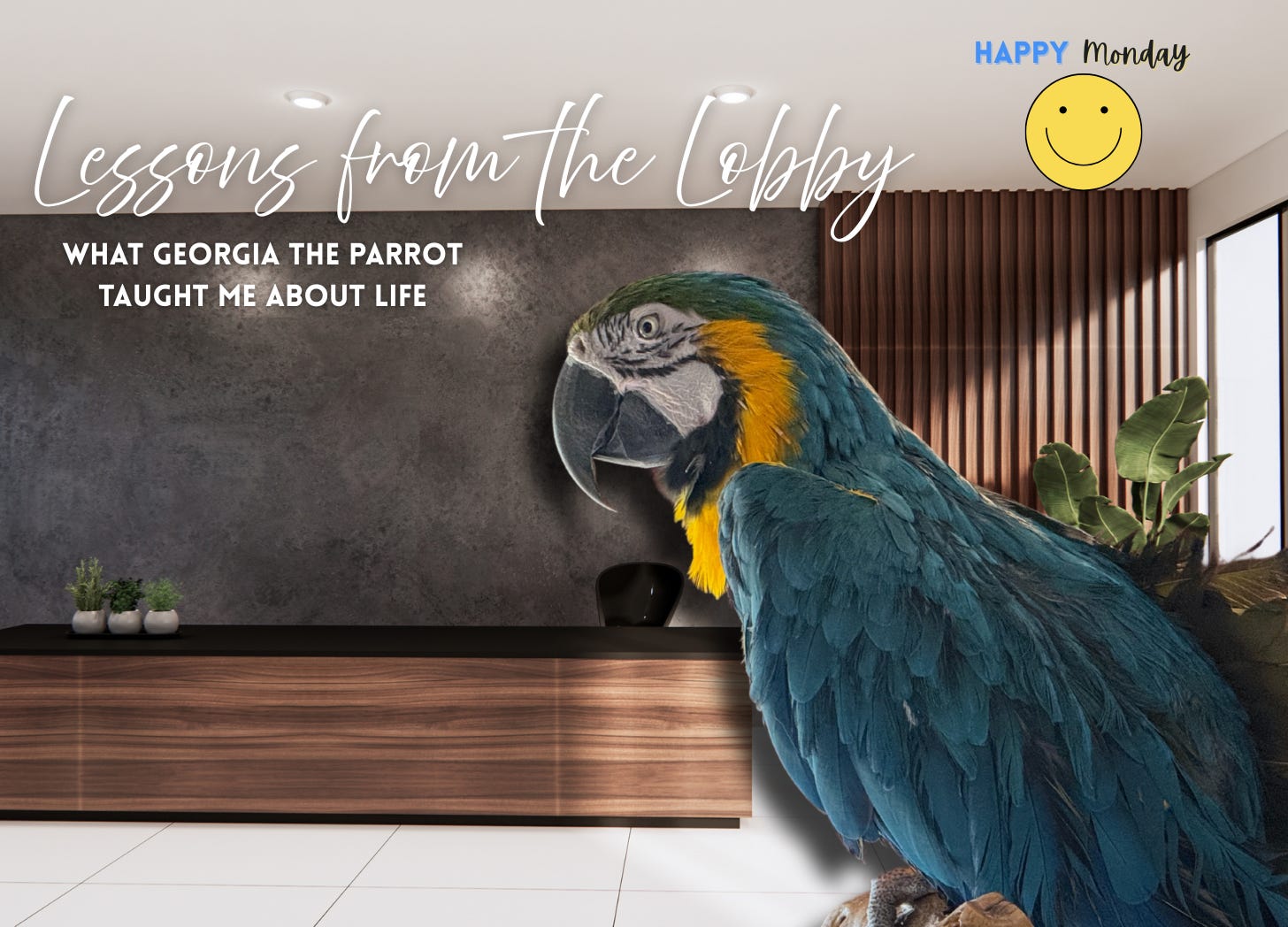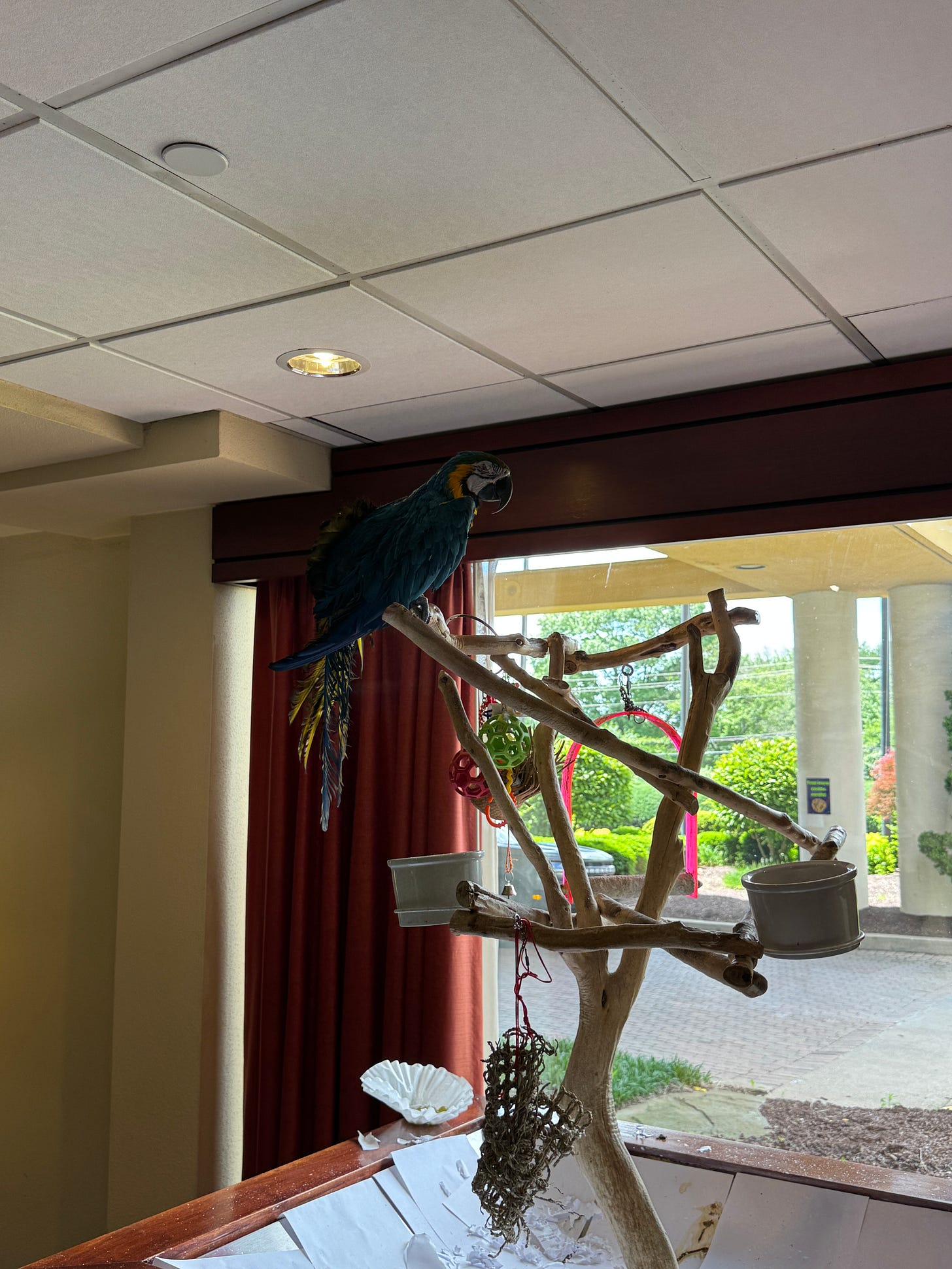This weekend, I attended a writer's workshop mostly for the agent pitch sessions. Between meetings, I found myself working in the hotel lobby when I noticed something unexpected: a giant parrot on a perch, staring calmly out the window.
I should mention that I'm terrified of birds. Once, I booked a room at Burr Oak State Park Lodge, planning to write in its beautiful wooden lobby. When I discovered birds flying near the ceiling, I immediately retreated to my room.
Yet this parrot didn't trigger my usual fear response. I learned her name was Georgia, and she's been a resident of this hotel for over 30 years. Originally from Florida, she apparently had a male companion who was sent back because she was "beating up on him."
At one point, the front desk clerk handed her a piece of paper, which she briefly chewed before returning to her window gazing, utterly unconcerned with the bustling lobby around her.
Something about Georgia's presence stayed with me throughout the day, offering unexpected wisdom. Here are three lessons I took from this unlikely mentor:
1. Presence Without Performance
Georgia wasn't doing anything spectacular. She wasn't flying, talking, or performing tricks. She was simply present, existing in her space with complete authenticity.
This struck me as I moved through the conference, where everyone (myself included) seemed to be performing in some way – polishing our pitches, carefully crafting our responses, trying to appear simultaneously confident yet humble, knowledgeable yet teachable. The energy was palpable – nervous, excited, sometimes desperate.
Georgia offered a different model. She wasn't trying to impress anyone or secure her next opportunity. Her worth wasn't tied to how well she could pitch herself. She had found her perch and was content to observe the world from it, chewing the occasional piece of paper when offered.
What would it look like, I wondered, to approach my writing career with that same groundedness? Not abandoning ambition, but not defining my worth by external validation either.
2. Fear Is Contextual
I'm afraid of birds – this is an established fact in my life. Yet Georgia didn't frighten me. She wasn't flying unpredictably around the space; she was contained, consistent, and calm. Context transformed my typical fear response into curiosity.
Similarly, I entered this workshop dreading the social aspects. I counted down the minutes until I could meet with the agents and then retreat to "a corner of solitude and safety." I had no interest in connecting with the others in attendance.
But while waiting for my pitch session, I found myself engaging with fellow nervous writers. We shared experiences about our sessions – brief moments of connection that weren't nearly as draining as I'd anticipated. Like my reaction to Georgia, the context changed everything. These weren't random social obligations but specific, purposeful interactions with people who understood exactly what I was experiencing.
Both situations taught me that our fears often appear differently when encountered in controlled, predictable environments. The flying birds at Burr Oak sent me running, but Georgia's steady presence was manageable. The thought of networking exhausted me, but those brief, authentic moments with other writers proved valuable.
3. Unbothered Doesn't Mean Unaware
What struck me most about Georgia was how she maintained a calm awareness. She wasn't startled by movement around her or bothered by the constant flow of strangers. Yet she wasn't asleep or disengaged either – she was observing, taking in her surroundings while remaining centered.
As writers, we're often told to be hyper-aware – of market trends, of networking opportunities, of our social media presence. This awareness frequently crosses into anxiety, making us reactive rather than responsive. Georgia demonstrated a different approach: aware but unbothered.
When the clerk approached with paper, Georgia accepted it without alarm. She engaged briefly, then returned to her window watching. She knew when to interact and when to maintain her boundaries – a skill many of us struggle to master.
Throughout the workshop, I tried to carry this lesson with me. I could be aware of the opportunities and challenges around me without becoming consumed by them. I could engage when it felt right and maintain my boundaries when needed.
As I headed home feeling good about how things went in my pitch meetings, I realized Georgia had offered as much guidance as any workshop session would have. Sometimes our best teachers appear in unexpected forms – even as a parrot I would typically avoid. That’s the beauty of the humility of learning, our focus for May.
The experience reminded me that wisdom often comes from observing those who have mastered what we find challenging. Georgia's three decades in that lobby had taught her something valuable about existing calmly amidst constant change and activity. She didn't need to perform or please; she didn't need to fear or flee. She had found her perch and claimed it fully.
Perhaps that's a worthy aspiration for a writer too – not to eliminate ambition or awareness, but to find our perch and observe the world from it with calm confidence, engaging when meaningful and maintaining boundaries when necessary.
And maybe, just maybe, the things we fear – whether birds or social interactions – have something important to teach us when we encounter them in unexpected ways.
This content is for educational and entertainment purposes and is not the same as therapy. If you need to talk to someone, go to PsychologyToday.com or one of the many online therapy platforms available and start treatment with a professional today!
For access to the weekly writing prompts, daily affirmations, and other exclusive content, consider becoming a paid subscriber!
Keep reading with a 7-day free trial
Subscribe to Kirk Sheppard to keep reading this post and get 7 days of free access to the full post archives.






